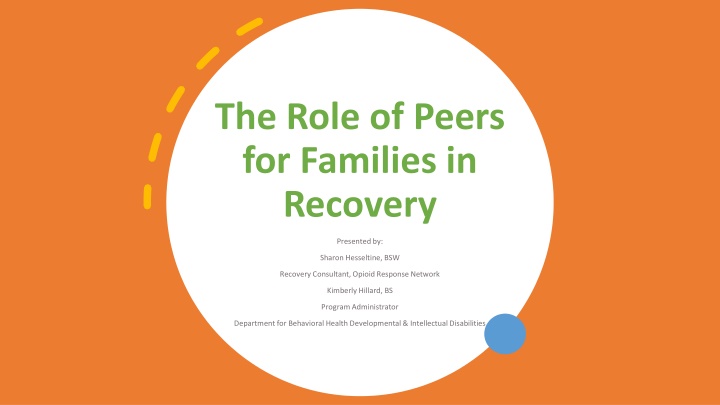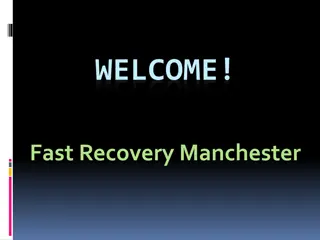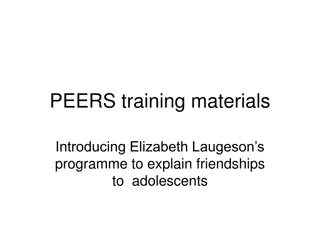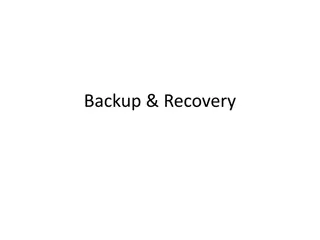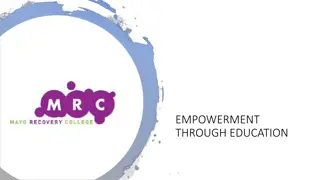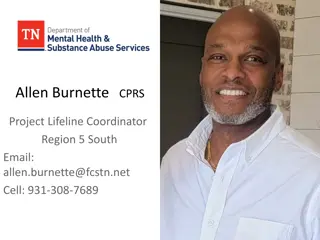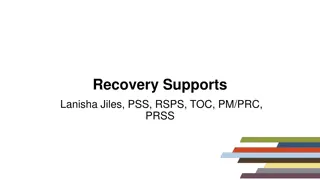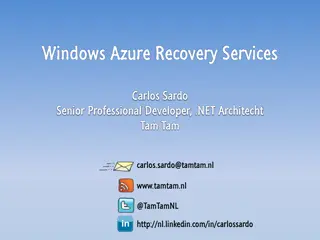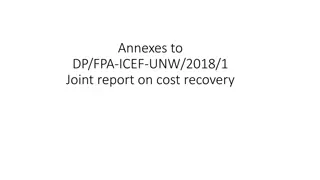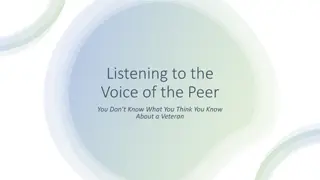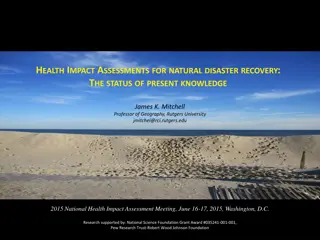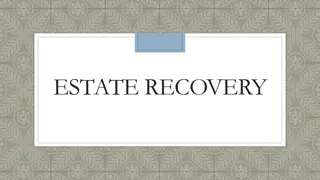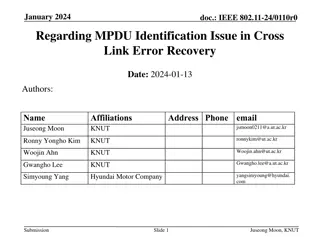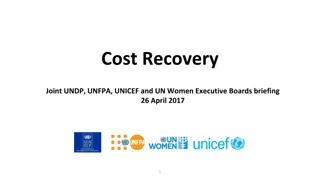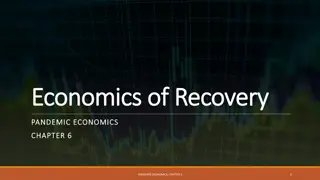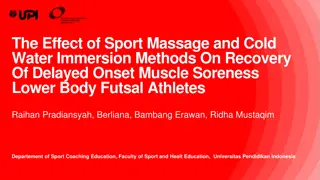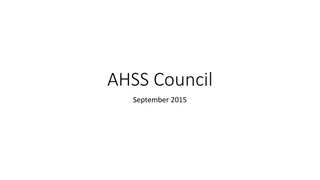The Role of Peers in Family Recovery
Peers in recovery provide essential support for families dealing with substance use disorders, enhancing long-term recovery and quality of life. Peer recovery support services complement clinical treatment, aiding individuals in maintaining recovery by building internal and external resources. Explore the functions and effectiveness of peer support specialists within multi-disciplinary teams to understand their impact on pregnant and parenting families.
Download Presentation

Please find below an Image/Link to download the presentation.
The content on the website is provided AS IS for your information and personal use only. It may not be sold, licensed, or shared on other websites without obtaining consent from the author.If you encounter any issues during the download, it is possible that the publisher has removed the file from their server.
You are allowed to download the files provided on this website for personal or commercial use, subject to the condition that they are used lawfully. All files are the property of their respective owners.
The content on the website is provided AS IS for your information and personal use only. It may not be sold, licensed, or shared on other websites without obtaining consent from the author.
E N D
Presentation Transcript
The Role of Peers for Families in Recovery Presented by: Sharon Hesseltine, BSW Recovery Consultant, Opioid Response Network Kimberly Hillard, BS Program Administrator Department for Behavioral Health Developmental & Intellectual Disabilities
Gain an understanding of the nature of Peer Recovery Support Services within the continuum of care for substance use disorder treatment Gain Explore the roles and functions of Peer Support Specialists as they apply to pregnant and parenting families Explore Learning Objectives for Today Examine the various settings utilizing Peer Support Specialists as part of a multi-disciplinary team Examine Illustrate the effectiveness of Peer Recovery Support Services Illustrate
What What are Peer Peer Recovery Recovery Support Support Services? Services? are Process of giving and receiving non- clinical assistance to support long- term recovery from substance use disorders A peer support specialist brings the lived experience of recovery, combined with training and supervision, to assist others in initiating and maintaining recovery Enhance the quality of personal and family life in long- term recovery (White, 2009) Peer recovery support services can support clinical treatment for substance use disorders
Peer Recovery Support Services Are essential ingredients in developing a recovery- oriented system in which clinical treatment plays an important, but not singular, role Substance use disorders are currently understood tobe chronic conditions that require long- term management Acute care substance use treatment without other recovery supports and community connections has often not been sufficient in helping individuals to maintain long- term recovery These supports help people in recovery build recovery capital the internal and external resources necessary tobegin and maintain recovery Best & Laudet, 2010; Cloud & Granfield, 2008
Peer Support: What Does it Look Like? Emotion - A peer support specialist brings their unique lived experience to the table by providing mutual emotional supports to individuals Affiliation - Support provided by a peer helps facilitate learning of social and recreational skills, build community, and give a person a sense of belonging Information - Peer support specialists provide informational support; sharing knowledge, information, and at times providing instruction on various topics Instrument - Peer support specialists may also offer instrumental support by giving concrete assistance to help accomplish tasks such as transportation and access to community or social services SAMHSA 2009
Advocating for people in recovery Peer Support Specialists engage in a wide range of activities Sharing resources and building skills Building community and relationships Leading recovery groups within provider and recovery community organizations Helping individuals build Recovery Capital through mentoring and Recovery Planning
Peer Support Specialists Help Individuals 01 02 03 04 inspire hope that people can and do recover and walk with people on their recovery journeys dispel myths about what it means to have a substance use disorder provide self- help education and link people to tools and resources support people in identifying their goals, hopes, and dreams, and creating a roadmap for getting there
Potential Functions of Peer Staff Some Examples Include: Conducting assertive outreach Facilitating life skills and other peer support groups Participating in all phases of person-centered planning processes including assessment and treatment/recovery planning Focusing on recovery capital assessment at the individual, family and community level Assisting people in identifying recovery goals and strategies to attain their goals Orienting people to the variety of resources available in the community and assertively connecting them to those resources
Breakout Rooms Thinking about families you have worked with that are early in their recovery journey: What are some ways you would want to be able to collaborate with Peer Recovery Support? What are two things you would want Peer Recovery Support Specialists to understand about the work you do with families so you could work together to best support children?
Treatment providers Recovery Community Centers/Recovery Community Organizations Hospitals (ED & OB) As part of Quick Response Teams in partnership with first responders At Syringe Service Programs In Public Health Departments Within Recovery Housing At primary medical care providers and Federally Qualified Health Centers (FQHC) Child Welfare Criminal justice settings including correctional facilities and drug court Domestic Violence Shelters Where Might You Find Peer Support Specialists?
People who have worked with peer recovery coaches provide strong testimonies of the positive impacts of peer recovery support on their own recovery journeys. Is Peer Recovery Support Effective? Research supports these experiences People receiving peer recovery coaching show reductions in substance use, improvements on a range or recovery outcomes, or both. Bassuk, Hanson, Greene, Richard, & Laudet, 2016; Reif et al., 2014
Is Is Peer Peer Recovery Recovery Support Support Effec Effecti tive? ve? Emerging research indicates that peer recovery coaching holds promise for supporting recovery from substance use disorders. Taken as a whole, the current body of research suggests that people receiving peer recovery support mayexperience: Improved relationship with treatment providers (Sanders et al.,1998; Andreas et al.,2010) Increased satisfaction with the overall treatment experience (Armitage at al.,2010) Greater housing stability (Ja et al.,2009) Increasedtreatment retention (Mangrum, 2008; Deeringet al., 2011; Tracy et al.,2011) Improved accessto socialsupports (O Connell, ND; Boisvert etal., 2008; Andreas et al.,2010)
Is Is Peer Peer Recovery Recovery Support SupportEffec Effecti tive? ve?cont. cont. Emerging research indicates that peer recovery coaching holds promise for supporIng recovery from substance use disorders. Taken as a whole, the current body of research suggests that people receiving peer recovery support mayexperience: Decreased criminal jusIce involvement (Rowe, et al.,2007; Mangrum,2008) Reduced substanceuse (Bernstein, et al., 2005;Boyd et al., 2005; Kamon &Turner, 2013; Mangrum, 2008; O Connell, ND; Rowe, et al., 2007; Armitage at al.,2010) Reduced recurrence rates (Boisvert et al.,2008) Decreased emergency serviceuIlizaIon (Kamon & Turner,2013)
Lived Experience - Video As you watch the video think about one word that comes to mind for you and be prepared to share it in the breakout following the video
Breakout Rooms Based on the video what is one word that your group would use to describe the work of Peer Support Specialists? In your community, who would you need to connect with to be able to begin the process of collaborating to support families with SUD and their children? What are 2 ways you can leverage the knowledge and lived experience of Peer Support Specialists in your community to increase your own understanding of SUD and strategies for supporting families?
References Armitage, E. V., Lyons, H., & Moore, T. L. (2010). Recovery Association Project (RAP), Portland, Oregon. Alcoholism Treatment Quarterly, 28(3), 339 357. Bernstein, E., Bernstein, J., Tassiopoulos, K., Heeren, T., Levenson, S., & Hingson, R. (2005). Brief motivational intervention at a clinic visit reduces cocaine and heroin use. Drug and Alcohol Dependence, 77(1),49 59. Boisvert, R. A., Martin, L. M., Grosek, M., & Claire, A. J. (2008). Effectiveness of a peer-support community in addiction recovery: Participation asintervention. Occupational Therapy International, 15(4),205 220 Boyd, M. R., Moneyham, L., Murdaugh, C., Phillips, K. D., Tavakoli, A., Jackwon, K., . . . Vyavaharkar, M. (2005). A peer-based substance abuse intervention for HIV+ rural women: A pilot study. Archives of Psychiatric Nursing, 19(1),10 7. Ja, D. Y., Gee, M., Savolainen, J., Wu, S., & Forghani, S. (2009). Peers Reaching Out Supporting Peers to Embrace Recovery (PROPSPER): A final evaluation report. San Francisco, CA: DYJ, Inc., for Walden House, Inc., and the Center for Substance Abuse Treatment, Substance Abuse and Mental Health Services Administration. Kamon,J.,&Turner,W.(2013).Recoverycoaching inrecovery centers:Whattheinitialdatasuggest: Abrief reportfromtheVermontRecoveryNetwork. Montpelier, VT: Evidence-BasedSolutions. Mangrum, L. (2008). Creating access to recovery through drug courts: Final evaluation report for the Texas Department of State Health Services. Austin, TX: University of Texas Addiction Research Institute. Retrieved from http://view.officeapps.live.com/op/view.aspx?src=http%3A%2F%2Fwww.utexas.edu% 2Fresearch%2Fcswr%2Fnida%2Fdocuments%2FATRFinalEvaluationReport-Final.doc Min, S. Y., Whitecraft, E., Rothbard, A. B., & Salzer, M. S. (2007). Peer support for persons with co-occurring disorders and community tenure: A survival analysis. Psychiatric Rehabilitation Journal, 30(3), 207 213. doi:10.2975/30.3.2007.207.213 O Connell, M. J., Flanagan, E. H., Delphin-Rittmon, M. E., & Davidson, L. (2017). Enhancing outcomes for persons with co-occurring disorders through skills training and peer recovery support. Journal of Mental Health, Epub ahead of print. Retrieved fromhttp://dx.doi.org/10.1080/09638237.2017.1294733 Rowe, M., Bellamy, C., Baranoski, M., Wieland, M., O Connell, M. J., Benedict, P., . . . Sells, D. (2007). A peer-support, group intervention to reduce substance use and criminality among persons with severe mental illness. Psychiatric Services, 58(7),955 961. The Value of Peers, SAMHSA, BRSS-TACS, 2017 Retrieved from: https://www.samhsa.gov/sites/default/files/programs_campaigns/brss_tacs/value-of-peers-2017.pdf
